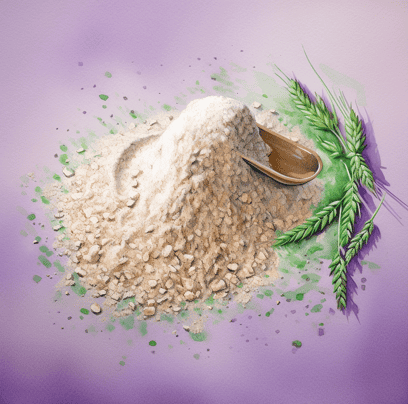
Don’t want to read the whole post?
Whole wheat flour is indeed vegan, as it’s made only from ground wheat kernels without any animal-derived ingredients. It’s a nutritious and versatile choice for those following a vegan diet, offering a healthier alternative for various recipes.
ABOUT ME
Be beauty. Be plant-based!
As a former Registered Nurse and avid plant-muncher, I’m in love with how simple plant-based foods make it easy to be beautiful.

You’ll also love:
Protein In Hair And Nails: Nature’s Beauty Bounty
Curious if whole wheat flour is vegan? This is a common question among health-conscious individuals embracing a plant-based lifestyle. In today’s fast-paced world, making informed dietary choices is more important than ever, especially for those following a vegan diet. Let’s clear up any confusion and explore the role of whole wheat flour in vegan cooking.
What Is Whole Wheat Flour?
Whole wheat flour is a nutritious ingredient made from the entire wheat kernel. This means it includes the outer wheat grain and the inner wheat kernels, packing a punch of natural nutrients. Distinguished from refined flours, whole wheat flour maintains its health benefits, offering a rich source of fiber, vitamins, and minerals.
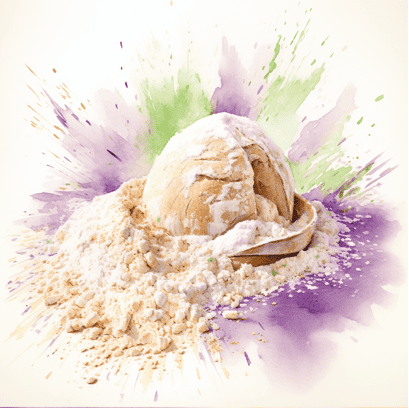
In vegan baking, whole wheat flour is a versatile and healthy choice. It’s an integral part of many vegan recipes, ranging from hearty breads to delectable vegan desserts.
Try this: Whole Wheat Vegan Monkey Bread at From My Bowl
Whole wheat flour’s robust flavor and nutritional profile make it a popular choice within the vegan community, proving that you can enjoy delicious baked goods while adhering to a vegan diet. Whether you’re an experienced baker or new to the world of vegan flour, whole wheat flour is a reliable and wholesome option to include in your culinary adventures.
Understanding Vegan Ingredients
When we talk about vegan ingredients, we’re referring to those free from animal-derived ingredients. This concept is at the heart of the vegan lifestyle, which extends beyond diet to a philosophy of minimising harm to animals.
In the vegan community, there’s a strong focus on not just eliminating meat and dairy but also ensuring that every aspect of food, including the ingredients used in baking, aligns with this ethos.
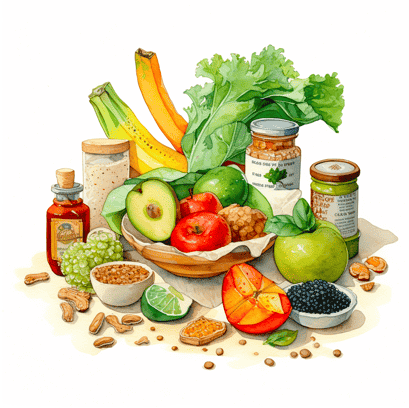
Vegan flour, particularly when used in vegan baking, plays a critical role. Many assume that all flour is vegan, but this isn’t always the case. Some flours are processed using animal-derived products or might be cross-contaminated with non-vegan ingredients during manufacturing.
Hence, choosing the right type of flour is crucial for those committed to a vegan lifestyle. Whole wheat flour, known for its vegan-friendly profile, is often a safe and nutritious choice for vegan recipes, offering a reliable base for a variety of dishes.
Is Whole Wheat Flour Vegan?
The good news is, yes, whole wheat flour is vegan! It is a plant-based product made solely from grinding wheat kernels, without any animal-derived ingredients. This makes it a staple in vegan diets, where it’s used extensively in a range of dishes, from basic bread to intricate vegan desserts.
Whole wheat flour’s vegan status makes it a good option for anyone following a vegan diet or looking to incorporate more plant-based foods into their meals. It’s a versatile ingredient in vegan baking, offering a healthier alternative to refined flours.
Incorporating Whole Wheat Flour in Your Diet
Adding whole wheat flour to your diet is easier and more delicious than you might think. This versatile ingredient can be a game-changer in your kitchen, especially for those on a vegan diet.
Whole wheat flour can replace regular flour in most recipes, offering a healthier, fiber-rich alternative. Its robust flavor and dense texture make it ideal for a variety of vegan recipes, from bread and pastries to pancakes and cookies.
One of the joys of vegan baking is experimenting with different ingredients. Whole wheat flour lends itself beautifully to this creativity.
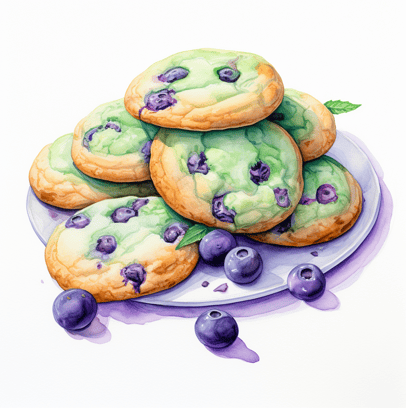
For instance, try using it in your favorite vegan desserts. Its rich, nutty flavor adds depth to cakes, muffins, and biscuits. If you’re new to vegan baking, start with simple recipes like whole wheat banana bread or oatmeal cookies. You’ll find that whole wheat flour not only enhances the taste but also contributes to the nutritional value of your baked goods.
Try these: Vegan Oatmeal Cookies at The Hidden Veggies
Benefits for Beauty and Health
Embracing whole wheat flour in your diet is not just good for your health; it can also contribute to your overall beauty and well-being.
Rich in nutrients like fiber, vitamins, and minerals, whole wheat flour supports a healthy digestive system, which is crucial for maintaining energy levels and a radiant complexion. For those following a vegan lifestyle, incorporating nutrient-dense ingredients like whole wheat flour is essential for balancing the diet.

The health benefits of whole wheat flour extend beyond basic nutrition. It can help in maintaining a healthy weight, reducing the risk of heart disease, and stabilising blood sugar levels.
These benefits are particularly appealing for anyone committed to a vegan diet, as it aligns with the goal of achieving optimal health through plant-based foods. Including whole wheat flour in your meals can be a simple yet effective step towards looking and feeling your best, embodying the true essence of a health-conscious and beauty-oriented lifestyle.
Exploring Flour in Vegan Baking
Diving into the world of vegan baking opens up a realm of possibilities with various types of flour. While whole wheat flour is a fantastic staple, it’s just one of many options available. For those exploring a vegan diet, understanding the diversity of flours can enhance your cooking and baking repertoire.
Consider coconut flour, buckwheat flour, and chickpea flour, each offering unique flavours and textures. Coconut flour is known for its sweetness and light texture, making it great for vegan desserts. Buckwheat flour, with its rich, earthy taste, is perfect for heartier baked goods. Chickpea flour, high in protein, is excellent for savoury dishes. Don’t forget about oat flour and almond flour vegan, both wonderful for adding a nutty, wholesome touch to your recipes.
These alternative flours not only diversify your baking but also cater to different nutritional needs and preferences within the vegan community.
Whole Wheat Flour vs. Other Flours
When comparing whole wheat flour to other types of flour, it’s important to consider their differences in nutrition and usage. Whole wheat flour, with its full nutrient profile, stands out as a healthful choice.
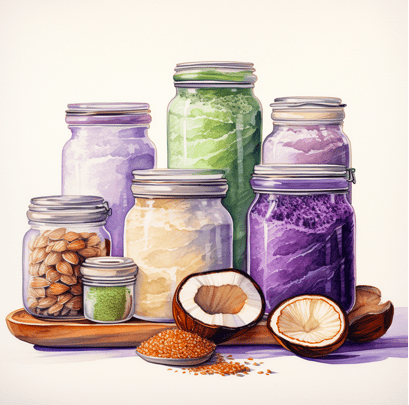
However, for those on a gluten-free vegan diet, alternatives like brown rice flour, tapioca flour, and sorghum flour come into play. These gluten-free flour blends offer similar versatility without the gluten, making them suitable for a wider range of dietary needs.
White flour vegan, regular flour, and unbleached flour, while vegan, often lack the fiber and nutrients found in whole wheat flour. White whole wheat flour, a lighter variety of whole wheat, provides a middle ground with a milder taste yet still retains much of the nutritional value.
Exploring these different types of flour can be a delightful journey, allowing you to tailor your vegan baking to your specific health goals and taste preferences.
Shopping Tips for Whole Wheat Flour
When shopping for whole wheat flour, there are a few key things to keep in mind to ensure you’re getting the best quality for your vegan diet. First, look for labels that specify “100% whole wheat” to ensure you’re getting a product made entirely from the entire wheat kernel. This guarantees the flour retains all its nutritional benefits.
Be cautious of labels that simply say “wheat flour” as they may actually be referring to white flour.
Also, consider the type of wheat used. Durum wheat, known for its high protein content, is often used in bread flour, making it a good option for homemade vegan bread. For those interested in exploring alternative flours, keep an eye out for products like barley flour, brown rice flour, and almond flour vegan. These can offer unique flavors and nutritional profiles, adding variety to your vegan baking. Remember, the key is to find flours that align with your dietary needs and culinary goals while adhering to vegan principles.
Conclusion
The good news for everyone embracing a vegan lifestyle is that whole wheat flour is not only vegan but also a nutritious and versatile option in the kitchen. It’s a good idea to incorporate it into your diet, whether you’re an experienced baker or just starting to explore vegan recipes. Whole wheat flour’s rich nutritional profile supports your health and aligns perfectly with the principles of a vegan lifestyle, making it a good choice for both everyday meals and special vegan desserts.
FAQ: Is whole wheat flour flour vegan?
1. What kind of flour is vegan?
Many types of flour are vegan, as they are made from ground grains, nuts, or seeds, without any animal-derived ingredients. Common vegan flours include whole wheat flour, coconut flour, buckwheat flour, chickpea flour, oat flour, and almond flour. When choosing flour for vegan baking, it’s important to check for cross-contamination with non-vegan ingredients if you’re strictly adhering to a vegan diet.
2. Can vegans eat whole wheat?
Yes, vegans can eat whole wheat. Whole wheat is plant-based and does not contain any animal-derived ingredients, making it suitable for a vegan diet. Whole wheat products, like whole wheat flour and whole wheat bread, are common staples in vegan cooking and baking.
3. Why is bread not vegan?
Not all bread is vegan, mainly because some recipes include non-vegan ingredients like dairy products (milk, butter), eggs, or honey. Additionally, some breads are made with dough conditioners or additives derived from animal sources. However, many types of bread, especially those labeled as vegan or made with simple ingredients like flour, water, yeast, and salt, are suitable for vegans.
4. Why is wheat bread not vegan?
While wheat bread can be vegan, some wheat breads are not vegan due to the inclusion of non-vegan ingredients such as dairy products, eggs, or honey. Another reason could be the use of additives derived from animal sources. To ensure wheat bread is vegan, check the ingredient list for animal-derived ingredients and look for brands that specifically label their products as vegan.